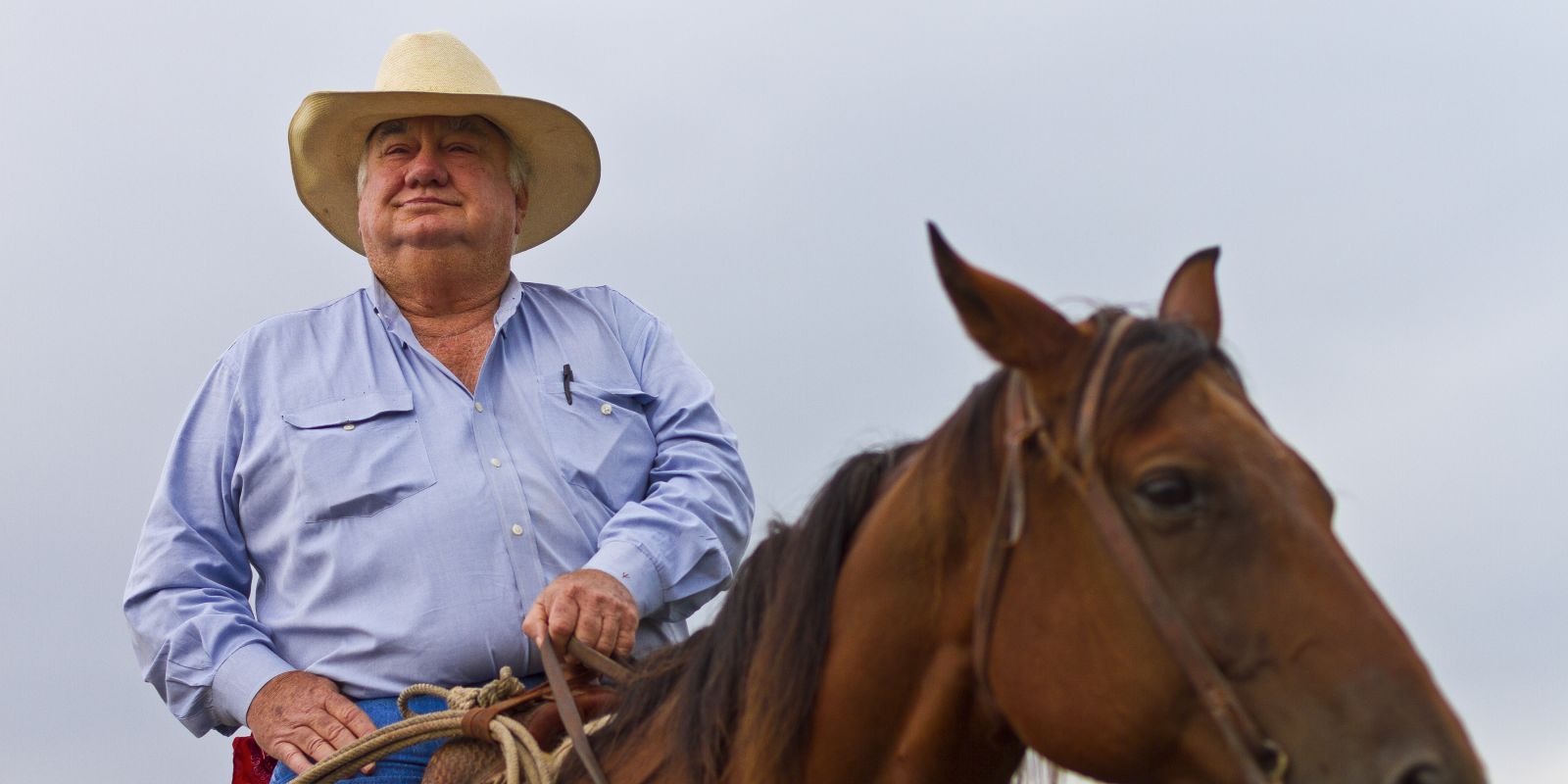
Pete Bonds Is Ranching’s Maverick
Alumnus rides the ups and downs of ranching.
When John “Pete” Bonds ’75 (’73 RM) was 2, his father died, leaving behind a 5,000-acre ranch in North Texas.
At 16, Bonds bought his first pen of cattle.
At 18, he started at TCU while continuing to oversee operations at Bonds Ranch.
Armed five years later with a bachelor’s degree in business along with a certificate in ranch management, Bonds began an unrelenting pursuit of business success that would span more than four decades. Along the way, he gained a reputation as one of the nation’s savviest cattlemen.
While candid in most instances, Bonds keeps certain financial figures private. For example, he wouldn’t reveal how many cattle his business runs each year: “That’s like asking how much money I have in the bank.”
However, Bonds owns and leases acreage in more than two dozen counties in Texas as well as in seven other states. Public records indicate that his property in northeast New Mexico exceeds 30,000 acres.
“This business has been very good to me,” Bonds said.
Others agree. Of late, Bonds seems to pick up some sort of lifetime achievement award on an annual basis. Among them, he received the Foy Proctor Memorial Cowman’s Award of Honor in 2016. In early 2017, he was inducted into the Texas Cowboy Hall of Fame and also received the W.A. “Bill” King Award for Excellence in Agriculture from the Fort Worth Farm and Ranch Club.
The accolades and acclaim might make some men think of hanging up their spurs or starting new chapters in life, but Bonds shakes his head at any mention of retirement.
“I don’t have any hobbies,” he said. “This is it.”
Photos by Mark Graham
Out of the Chute
For this second-generation rancher, the cattle business has indeed always been it. When his father, P.R. “Bob” Bonds, decided to buy a Texas ranch in 1933, the oilman fell hard for an expanse of pastureland near Saginaw, a small town just north of Fort Worth.
Pete Bonds’ mother, Betty, continued her husband’s legacy with the help of a ranch foreman named Pete Burnett.
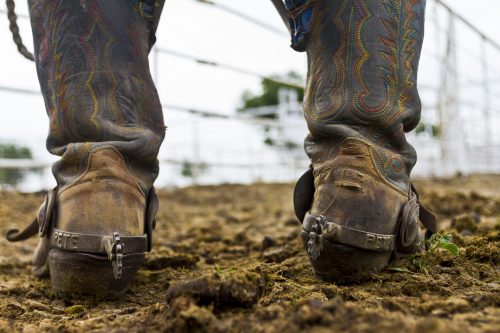
The well-worn boots and personalized spurs of Pete Bonds. Photo by Mark Graham
“That man was my father figure and my best friend,” said Bonds, who earned the nickname “Little Pete” from following the foreman around all day. “Even though his formal education ended with the eighth grade, Pete Burnett was the smartest man I ever knew and the best cowboy I ever saw.”
Burnett’s work ethic had a lifelong effect on his young charge. “He told me the best fertilizer you can ever have is your own footprint,” said Bonds, who spends about a third of the year on the road, meeting with suppliers and buyers as well as overseeing his ranches.
Burnett, who died in 1983, modeled another powerful lesson that has served Bonds well: “Treat people with respect because you are no better than anyone else.”
Partly because his father’s formal education ended by age 10, Bonds felt determined from an early age to earn a college degree.
“The best thing I ever did in terms of my schooling was TCU’s ranch management program,” Bonds said. “All the professors had been in the cattle business. They really knew what they were talking about, and they opened my eyes to the possibilities of what our 400-cow outfit could become.”
Bonds later served as president of the ranch management program’s alumni organization and was named outstanding alumnus in 2006.
“Of all the disciplines at TCU, the ranch management program is the one that is the best in the nation,” Bonds said. “When young people ask me how to succeed in this business, I tell them to get their MBA, then go to the ranch management program. If they do that, they’ll know what they need to know.”
All in the Family
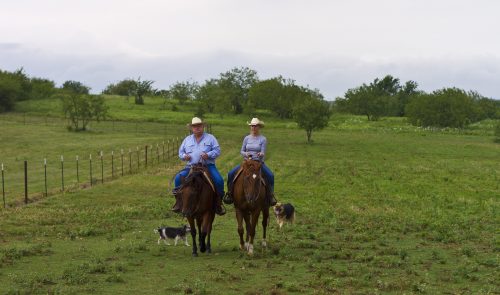
Pete Bonds and his wife, Jo, ride accompanied by two of the Bonds Ranch dogs. Photo by Mark Graham
Bonds left TCU with a first-rate education and also the woman who would become his wife, Josephine “Jo” Tabb ’75, who earned a degree in ballet after growing up on a Georgia farm.
“Jo saw me one night doing the Cotton-Eyed Joe on crutches at a beer joint,” Bonds recalled with a hearty laugh. “I must’ve been an impressive sight.”
The couple married a year after graduation, and Jo opened a dance studio on the Bonds Ranch. The school continues today.
In quick succession, the couple had three daughters, each of whom has embraced ranching.
The oldest daughter, Missy Bonds ’01 RM, serves as her father’s second in command. She became the youngest woman elected to the Texas and Southwestern Cattle Raisers Association board of directors as well as the first female to hold a policy leadership position within that organization.
Middle daughter Bonnie Bonds-Anderson owns a ranching operation in Colorado with her husband, Clint, and their four children.
After earning an MBA from Georgetown University in Washington, D.C., youngest daughter April Bonds returned to Texas to work in the family business. She guides strategic planning and manages the Bonds Ranch’s quarter horse program.
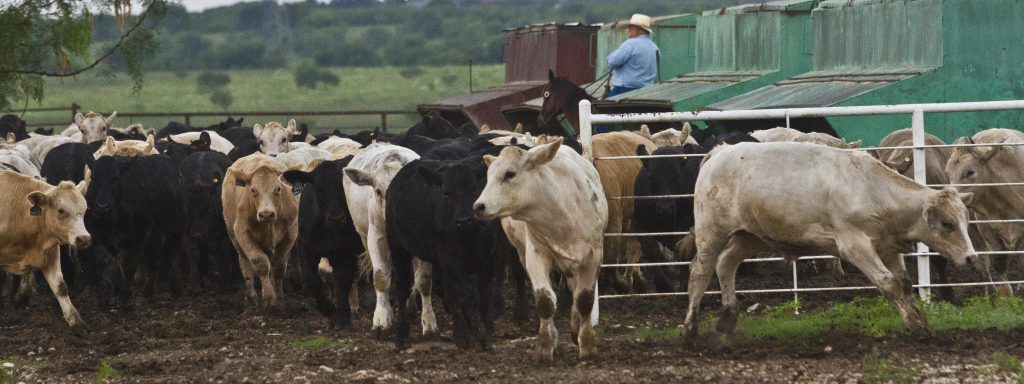
Pete Bonds helps move cattle into holding pens to be weighed and shipped. Photo by Mark Graham
“My golf is being on horseback on the ranch. I love nothing more than riding out, working the cattle.”
Pete Bonds
‘The System’
However, the Bonds ranching legacy might not have survived the daughters’ childhoods were it not for a lightning-bolt moment, one that featured a shotgun and beer.
“We were not doing so well in 1980,” Bonds said. “Things were really not going good at all, so I went out dove hunting one day but was more sitting there ‘thinking drinking’ when it dawned on me that all other businesses focus on return on equity as one of the business matrices to evaluate the health of their operations.”
Until then, Bonds maintained “a typical rancher mindset, which was that all this was more of a way of life.” But with his epiphany, Bonds developed a concept he dubbed “the system.”
“Today, I approach everything as straight business,” he said. “It’s simple, but it takes effort and discipline.”
Under the system, Bonds Ranch de-emphasized its interests in feed-yard operations, the segment of the business that involves purchasing cattle, most of them steers, and feeding them for 160 days before sending them to slaughter.
Instead, the business-savvy cattleman turned to the futures market as a way to guarantee profitability while positioning himself as a stocker-operator. “Now we buy cattle, keep them a short time, like maybe 50-180 days, and sell them to the feedlots,” Bonds said. “The futures market on the Chicago Mercantile Exchange allows us to hedge any losses.
“We use futures as a risk management tool but don’t trade in them thinking the market is going up or down,” he said. “It’s all about locking in profitability, and we keep doing it over and over and over.”
Those 50-180 days that cattle are in Bonds’ possession and putting on weight might make the ranch about $40 per steer. Contrast that with a cattleman running a cow-calf operation (raising the animals from birth), who might make about $30 per head over the course of an entire year.
But even more than profit per head, Bonds looks at annual return on equity. In many years, Bonds Ranch’s return on equity rivals the value of some companies on the Standard & Poor’s 500.
“I got away from the system twice, and I got slapped,” Bonds said. “The whole point is we don’t know or care what the market is going to do.
“What we do with futures is to level those great years out,” he said. “Some years we will lose so much money on futures it’s ridiculous, but our strategy is to keep the trajectory moving upward.”
Because of the volume of cattle that the ranch runs through the system, Bonds no longer cares what breed the ranch buys and sells.
“When people ask what kind of cattle I look for, I tell them I like the kind that makes money,” he quipped.
Bonds Ranch also raises quarter horses, mostly for use on the ranches.
“My golf is being on horseback on the ranch,” he said. “I love nothing more than riding out, working the cattle.”
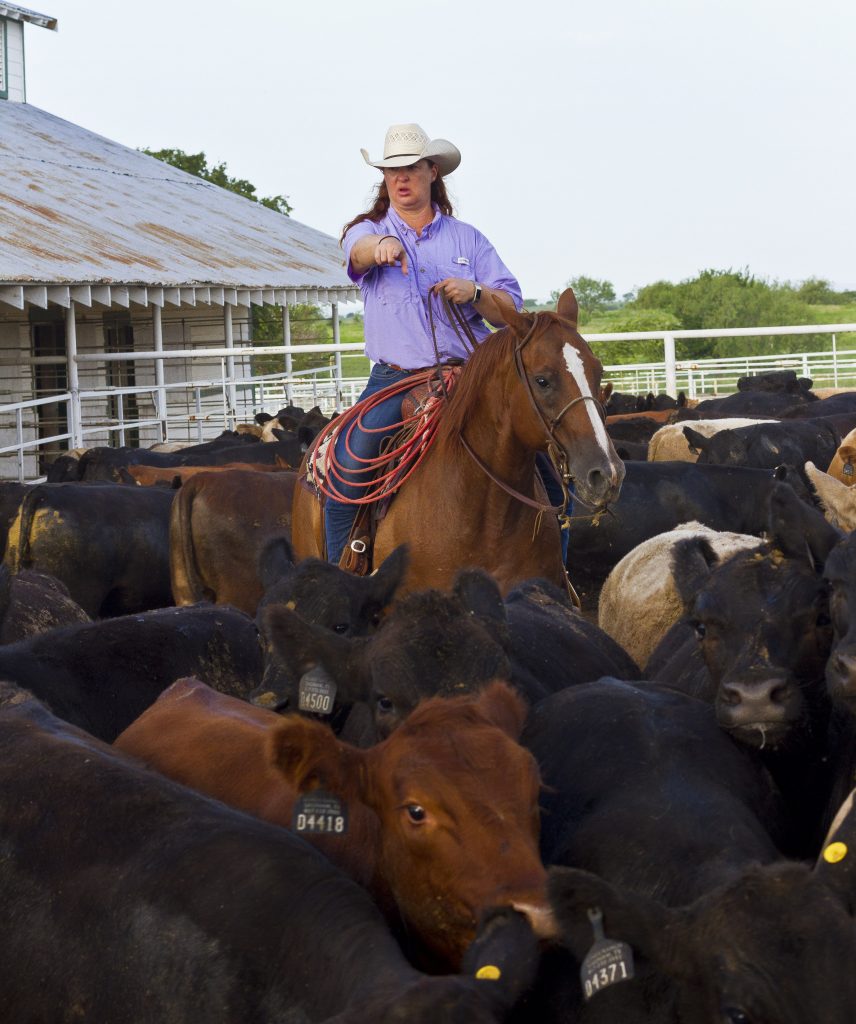
Pete Bonds’ daughter Missy Bonds ’01 RM herds cattle into a holding pen to be weighed and shipped at Bonds Ranch near Saginaw, Texas. Photo by Mark Graham
“I don’t remember a time when he wasn’t on horseback,” Missy Bonds said. “Daddy gave us girls a strong work ethic. He’s tough, and he is not shy about letting you know when you’ve screwed up, but he has always been fair.”
Bob McKnight ’82, an Odessa-based rancher who served with Bonds as an officer with the Texas and Southwestern Cattle Raisers Association, said Bonds “is serious about this industry, and his passion for what he does is unparalleled.”
“That, combined with a great energy, a powerful intellect and a heart as big as Texas, made him a very effective leader for our organization,” McKnight said.
During his 2013-16 term with the cattle association, Bonds used his bullhorn to promote the beef industry with the national media.
“The World Health Organization issued a statement that beef is bad for you in 2015, and Fox Business brought a correspondent out to talk to me,” he said. “I said I wanted to know who these granola-eating vegetarians were who want to do away with the beef industry. Afterward, the Fox people said they’d like to give me my own show, but they’d have to bleep half of what I say out.”
In recent years, Bonds Ranch has made concessions to niche markets that appeal to certain populations looking to eat “clean.” He made the move to build Bonds Ranch’s exports to overseas buyers.
“The truth of the matter is grass-fed, organic beef or non-hormone-treated beef has a larger carbon footprint than a regular cow,” Bonds said. “But if there’s a demand for it, we’ll have at it.”
Today, Missy Bonds manages the ranch’s hormone-free cattle program, a necessity for business with the European Union and Japan.
Bonds Ranch continues to adapt to the times, incorporating the latest technology to manage the herds.
He was ahead of the industry curve in adopting ear tags to electronically identify his cattle. “If you don’t grow and change,” Bonds said, “your business dies.”
McKnight cited such willingness to keep learning as an essential element in Bonds’ longevity.
“That comes naturally to him because he loves what he does. He’s truly one of the best at it, too,” McKnight said.
Bonds offered his own take on his ranching experience.
“This business has been like throwing a snowball off Mount Everest,” he said. “All of a sudden you have an avalanche.”
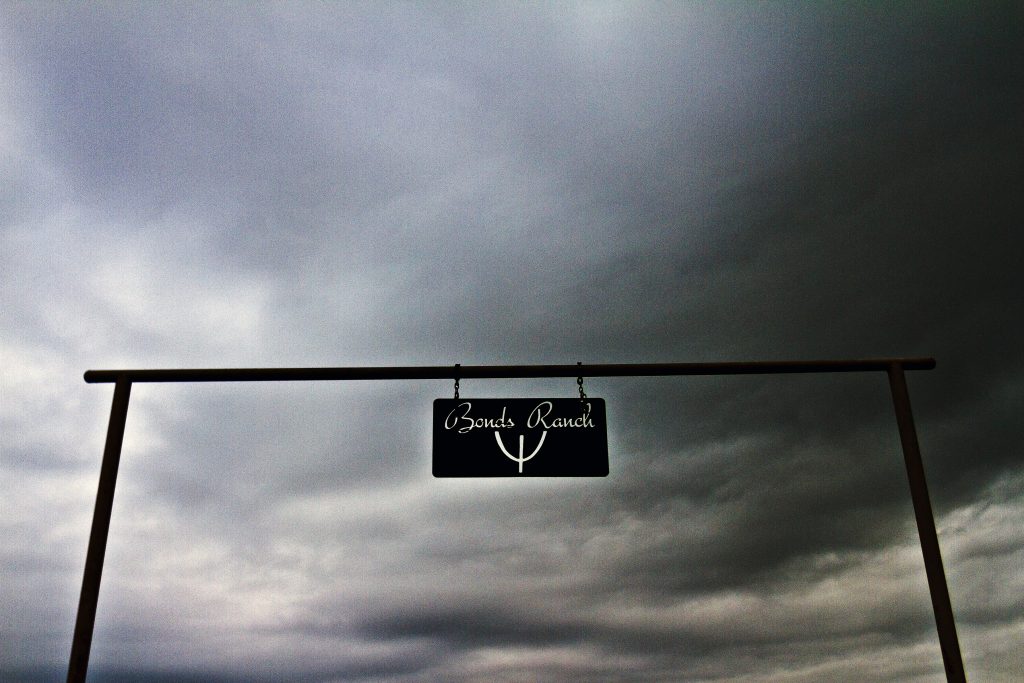
The Bonds Ranch sign, seen on an early morning near Saginaw, Texas. The “turkey foot” is the brand used by the ranch. Photo by Mark Graham










Your comments are welcome
4 Comments
What a great Ranching Family, and great people
Very nice story-Alan Luskey
Great family I had honor to meet Pete Bonds at Washington on Brazos Southwestern Cattle Meeting when he was our President.
Thanks for info. I drive almost the whole distance of Bonds Ranch road twice a week. I wondered if there was still a working Ranch and am pleased to know there is.
“Big Pete”, Bond Ranch foreman, and wife Mattie were my dad’s aunt and uncle. We used to to visit them at the ranch when I was a little girl. So happy to know that this beautiful place, which at the time was out in the wide open spaces, has continued to thrive and keep alive the spirit and integrity of ranching.
Related reading:
Features
Living Off the Land
TCU’s Institute of Ranch Management sends graduates abroad to improve the world’s agricultural practices.
Features
The Crucial Crusade of an Amazon Cowboy
John Cain Carter, a former elite Army soldier and a 1993 graduate of TCU’s Ranch Management program, is fighting to save the Amazon rain forest by convincing others to embrace an ethos of sustainable agriculture.
Campus News: Alma Matters
Food for thought
Ranch Management class explores sustainable food production.